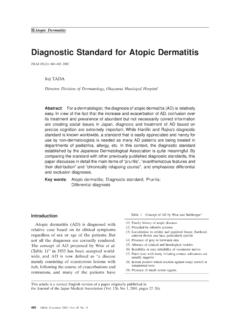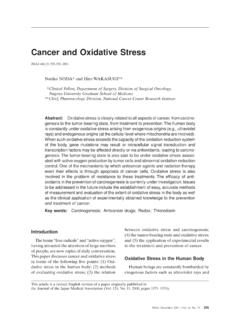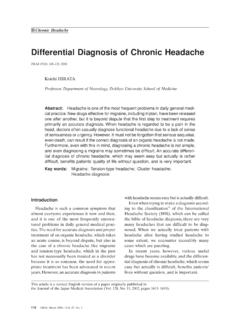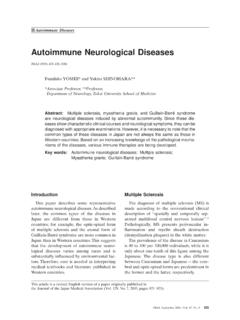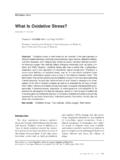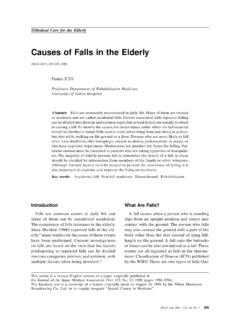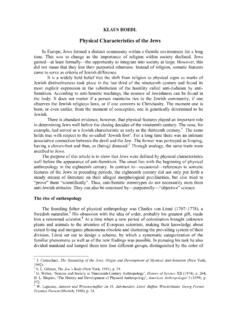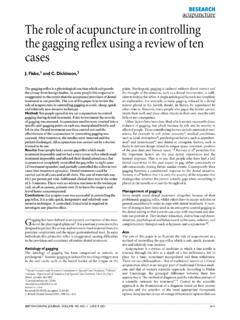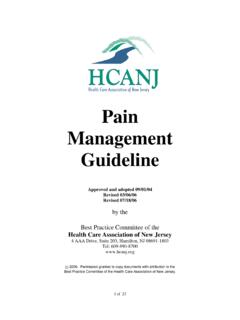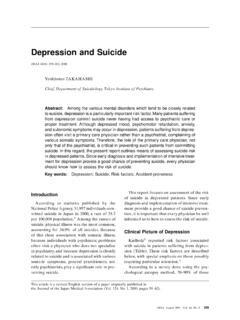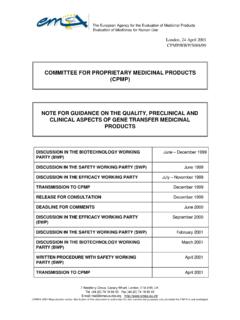Transcription of Psychotherapy and Psycho-education of Depression
1 230 JMAJ, May 2001 Vol. 44, No. 5 Psychotherapy and Psycho-education ofDepressionJMAJ 44(5): 230 234, 2001 Kazutaka NUKARIYAA ssistant Professor, Department of Psychiatry, Tokyo Jikei University Schoolof MedicineAbstract:Progress of anti-depressants has reduced the number of depressivepatients requiring hospitalization and increased those cases that may be treated atoutpatient clinic. However, the drug therapy is not necessarily effective for allcases. The importance of Psychotherapy is being re-evaluated for the patients,including particularly those for whom drug therapy is not indicated. Among psy-chotherapies are the psychoanalytic therapy, cognitive therapy, behavior therapy,interpersonal therapy, etc.
2 , and in recent years therapies that can achieve theeffects in short-term are prevalent. Interests in Psycho-education are mountingbecause of studies that family relations influence the prognosis and of theincreased importance attached to informed consent. This means that the physiciansand therapists work with the patient and family to deepen understanding of thedisease and to prevent its aggravation as well as recurrences. A depressive personvisiting a primary care physician for the first time should be seen with a flexibleattitude depending on his/her signs and symptoms without adhering to therapiesof different kind.
3 In other word, there is no need to adhere to one therapythroughout the prodromal, acute and recovery words:Mood disorder ( Depression ); Psycho-education ; PsychotherapyThis article is a revised English version of a paper originally published inthe Journal of the Japan Medical Association (Vol. 124, No. 1, 2000, pages 39 42).IntroductionDrug therapies are the main stream oftreatments for Depression and their efficacy isirrefutable as discussed in many articles. In theclinical scene, it is said that drug therapy iseffective for about 80% of the patients forremoving themselves from the depressivephase and it becomes more effective whencombined with Psychotherapy .
4 There are,however, light and dark sides to the drugtherapy, and in cases where the drug com-pliance is inadequate and drug therapy isnot suitable, Psychotherapy should mainly concretely, there may be a youngpatient whose parent declines the drugtherapy because of uncertainty about sideeffects, a patient may be pregnant or planningpregnancy, a patient may easily develop sideeffects of an anti-depressant because he/she iselderly or because of somatic complications,JMAJ, May 2001 Vol. 44, No. 5231or a patient may be extremely uneasy aboutthe drug therapy because of the past history ofallergic reaction, or a patient is resistant to thedrug therapy.
5 One should be aware that thedrug therapy is not omnipotent for treatmentof suicidal ideation for death such as Iwish to disappear , there is no use for livingany longer or I want to die is observed,drug therapy or an emergency hospitalizationshould be paper discusses the outline and thecurrent state of Psychotherapy and Psycho-education focusing on mild and maskeddepression seeking primary of PsychotherapyPsychoanalytical therapy has long beenrelied on for treating depressive mental disor-ders, but its time-consuming and expensivenature have limited the number of order to overcome these difficulties, theshort-term psychotherapies such as cognitivetherapy, behavioral therapy, and interpersonaltherapy came to be widely practiced forachieving therapeutic effects in a short periodof time.
6 These therapies differ from psycho -analytical therapy in that the therapist givespositive and definite guidance and completesthe therapy on a short-term basis by setting aclear-cut objective based on discussion therapy was developed by Becket ) and hypothesizes that although depres-sion is a mood disorder, depressive patientshave peculiar distorted cognition, which dete-riorates their mood. This distorted cognition iswhat is lately described as negative correcting the distorted cognition, thetherapy aims at improving the behavioral therapy reinforces aperson s manner of addressing things byadvice, feedback, and compensation based ona hypothesis that the mood can be changed bychanging behavior.
7 According to this theory,the reason why there are so many depressiveelderly persons is because the elderly findslittle pleasure in daily life. They are recom-mended to engage in activities that they canenjoy as much as possible (Lewinsohn et al.,1974).2)Interpersonal therapy was developed byKlerman3) and Weissman et ) from the inter-views by Sullivan et al. focusing on the inter-personal relationship in 1930s. The therapy ischaracterized in that the treatment period isas short as 12 to 16 weeks and that the prob-lem is defined by focusing on the current inter-personal relationship, not on cognition problem area is grief after the loss of anobject; discord involving the interpersonalroles, which is the friction in personal relation-ship, change in roles, and lack of interpersonalcapacity.
8 By clarifying the problem and cap-turing the positive and the negative emotionsthat generate, the interpersonal relationshipof the past is understood and the alternativesare handling grief, the patient is encour-aged to express emotions at the time of theloss of an object, to reconstruct the relation-ship that has been lost, and to start attach-ments and activities anew. Discord amongroles often arises out of differences in expec-tations toward respective roles. It should bedetermined whether or not to re-negotiate,whether the situation is at a standstill, or part-ing is unavoidable, and then solutions to theproblem are prompted, gaps are clarified andgrief work is performed.
9 As for changes in therole, the patient is made to give up the rolehe/she has been enacting, to express anger orsense of loss, to acquire techniques requiredby the new role toward the society and tosupport building a new social is a general term for aneducational approach of assistance to offerPSYCHOTHERAPY AND Psycho-education OF DEPRESSION232 JMAJ, May 2001 Vol. 44, No. 5accurate knowledge and information aboutthe nature and methods of treatment andaddressing the disease needed for cure addedwith consideration for )In the background of why psycho -educationis now regarded important is that litigationsagainst the unilateral treatment provided bymedical profession have increased.
10 As abun-dance of medical information passes to thepatients side, it is difficult and often chaotic tounderstand and deal with them adequately. Astudy on how the family expresses emotioninfluences prognosis of mental disorder sug-gests the importance of understanding of thedisease by the family and closed. This meansnot only the unilateral offering of informationfrom the medical service provider but alsoremoving misunderstandings of the disease,improving cognition, and evaluating the man-ner of addressing problems surrounding thedisease. Thus, it is called Psycho-education ,not mere education . The objects are not lim-ited to psychiatry patients but include thosesuffering from cancer, AIDS, and the sequel ofstrokes.

